Ready to learn more?
Get all the details straight to your inbox!
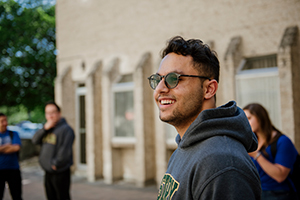
Every degree program at Luther College offers a study abroad option and an optional experiential learning component where you gain real world experience and get paid while going to school!

To enrol as a Luther College student, simply fill out the University of Regina application form and select Luther as your campus of choice.
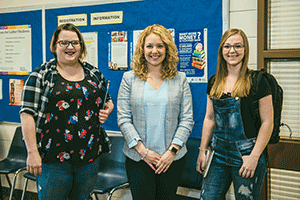
The priority deadline for academic application is March 15. To book a personalized enrolment counselling appointment, contact our Recruitment Office at 1-306-206-2117.
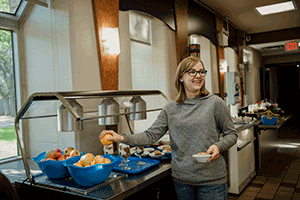
Living in The Student Village at Luther College, our student residence, comes with a choice of healthy, nutritious meal plans. That means no grocery shopping, no meals to cook, and no dirty dishes to worry about. You can focus on your studies and wellness!
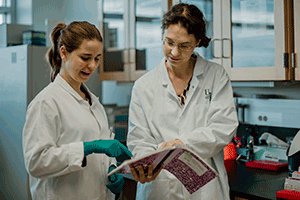
Luther College offers Bundles programs that group together first-year students and classes to give you a great start and help ease the transition from high school to university.
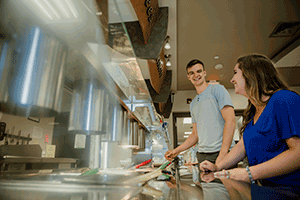
Eating better means studying better. The Luther Cafeteria offers fresh, healthy, nutritious meals seven days a week with a self-serve “all-you-care-to-eat” concept students prefer.
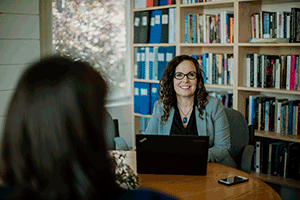
Free enrolment counselling support and invaluable one-on-one academic advising are available for all programs at Luther College.
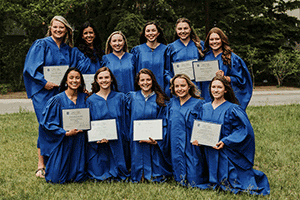
Luther College students are U of R students and receive all the same benefits. Upon graduation you will receive a U of R degree.
Get all the details straight to your inbox!
By Brenda Anderson (Women’s and Gender Studies/Religious Studies)
Project of Heart is an initiative supported by Luther College that fits within our larger commitment to the Truth and Reconciliation process. The seven-week workshop attracted over 40 participants from the Regina community as well as university students, faculty and staff. Project of Heart was developed by a University of Regina student, Sylvia Smith, as part of her Masters of Education program. It was her way to address the dearth of teaching tools on Indigenous history in the school system, but the activist/artistic process is applicable to any community. Jenna Tickell, a graduate student in the Women’s and Gender Studies Program, ran the course for us at Luther College.
The main point of Project of Heart is for participants to research a residential school closest to their locale. For the group at Luther College, this meant learning about the Regina Indian Industrial School, located at what is now close to the Paul Dojack Centre. The process culminates in participants painting tiles representing the children who died or who attended the school; these will be used to create an artistic piece that will stay at Luther. Participants also commit to activist goals; in this case, this included petition-signing towards the memorialization of the children buried in the school cemetery. You can find this petition in the Luther College Academic Office mailroom (LC 200), should you wish to support this initiative.
The programme was such a success that we hope to be able to support another workshop next winter. The three reflections below, the first two of which are written by first-year students, and the third by a community member, attest to the power of this program to transform our understanding of Canada’s colonialist past and move us forward in our institution’s commitment to the Truth and Reconciliation process.
The commemorative tiles were honoured and smudged in a ceremony conducted by Elder Betty McKenna and her assistant, Calvin Racette, with an honour song drummed by Lee Prosper (member of the Canadian Roots Exchange Reconciliation Team). A final ceremony was held at the RIIS cemetery on March 26. For more information on the event, read CBC Saskatchewan's article about it here. Evaluation sheets were collected with an eye to recommending the workshop be held at least one time in the 2016-2017 academic year.
For more information on how the first Project of Heart came to be, visit http://projectofheart.ca/.
Below are three stories that are related to Project of Heart initiative on campus: Mirella Matenda (Business Administration) and Elizabeth Capnerhurst (Political Science with a minor in Religious Studies) are both first-year students enrolled in Dr. Michelle Folk’s RLST 100 class this semester. Dr. Folk provides the option for students to participate in a community-engaged project as a portion of their grade. Sharon Hurd is a member of Wesley United Church.
Project of Heart: A Student’s Love for Community Engagement
By Mirella Matenda
I am a first year student at the University of Regina after graduating from Miller High School. I have always enjoyed being present in the community by volunteering and attending awareness causes. I am a “hands-on” person and feel more fulfilled when I am actively learning versus solely reading a textbook. One way I can express this interest in my university courses is to choose a volunteer/community-engaged learning option for a term project if it is provided. In my Religious Studies 100 course at Campion College this semester, I was given the opportunity to participate in an engaged learning component, and I jumped at the chance because I knew that getting out and doing something would be more interesting and rewarding to me than hours of research on the computer. Although there were many options, I chose to participate in Project of Heart because Aboriginal history is a very significant yet often ignored part of Canada. For example, many people do not know about the history of residential schools. This was a way for me to participate in acts of reconciliation and acknowledge past wrongdoings. Project of Heart allowed me to be part of a group with a shared goal and to have practical experiences be a foundation of my learning.
Project of Heart: A Personal Choice
By Elizabeth Capnerhurst
There are a number of reasons why I choose to participate in Project of Heart as my engaged learning project. My paternal grandmother was Saulteau, and when she married an Englishman, she lost her status. However, her younger sister married a First Nation’s man, and they lived on a nearby reservation. There was never much contact between the sisters, so I have always been aware of the separation between indigenous and non-indigenous peoples in Saskatchewan. It was not until after moving to Regina, marrying, and raising my children, that I really began to follow First Nations and Métis issues. I became more aware of racism, the intergenerational effects of residential schools, and the economic disparity that exist between indigenous and non-indigenous peoples. It was last year when I first learned of the existence of the Regina Indian Industrial School, through a report on CTV’s local evening news. At the time, I felt that I should inquire into how I could become involved in helping to preserve and maintain the area where the children, who attended the school, are buried. The news report also featured pictures of the gravesites. As a mother to see graves of children, who were taken from their families and were never able to return home, was heart wrenching. Since I had not followed up on this, when I heard about Project of Heart in class, I felt that this may be my opportunity to become involved in helping to have the area designated as a heritage/cemetery site, thereby allowing relatives of the children to come and perform the traditional ceremonies that were denied the children at the time of their death, and to provide a lasting memorial of their lives and a reminder of the injustices done to our indigenous peoples to everyone.
Project of Heart: A Participant’s “Doorway Statement”
By Sharon Hurd
I have entered a doorway for learning more about the truth and reality of our Canadian past.
I became aware of the short and painful lives of children who died while attending the Regina Indian Industrial School.
I felt the pain of parents whose children were stolen from them.
I came face to face with the oppression and cultural genocide imposed on the children and their families by my ancestors.
I recognized the complicity of government, churches and other institutions in creating the ongoing impact felt by generations to this day and going forward.
I felt the hope and love involved in the process of bringing about reconciliation and justice.
I feel challenged to take forward actions from the Truth and Reconciliation Commission to my church congregation and to my friends.
I feel grateful to Sylvia Smith, Jenna Tickell, Brenda Anderson, and Luther College at the University of Regina for opening this door.